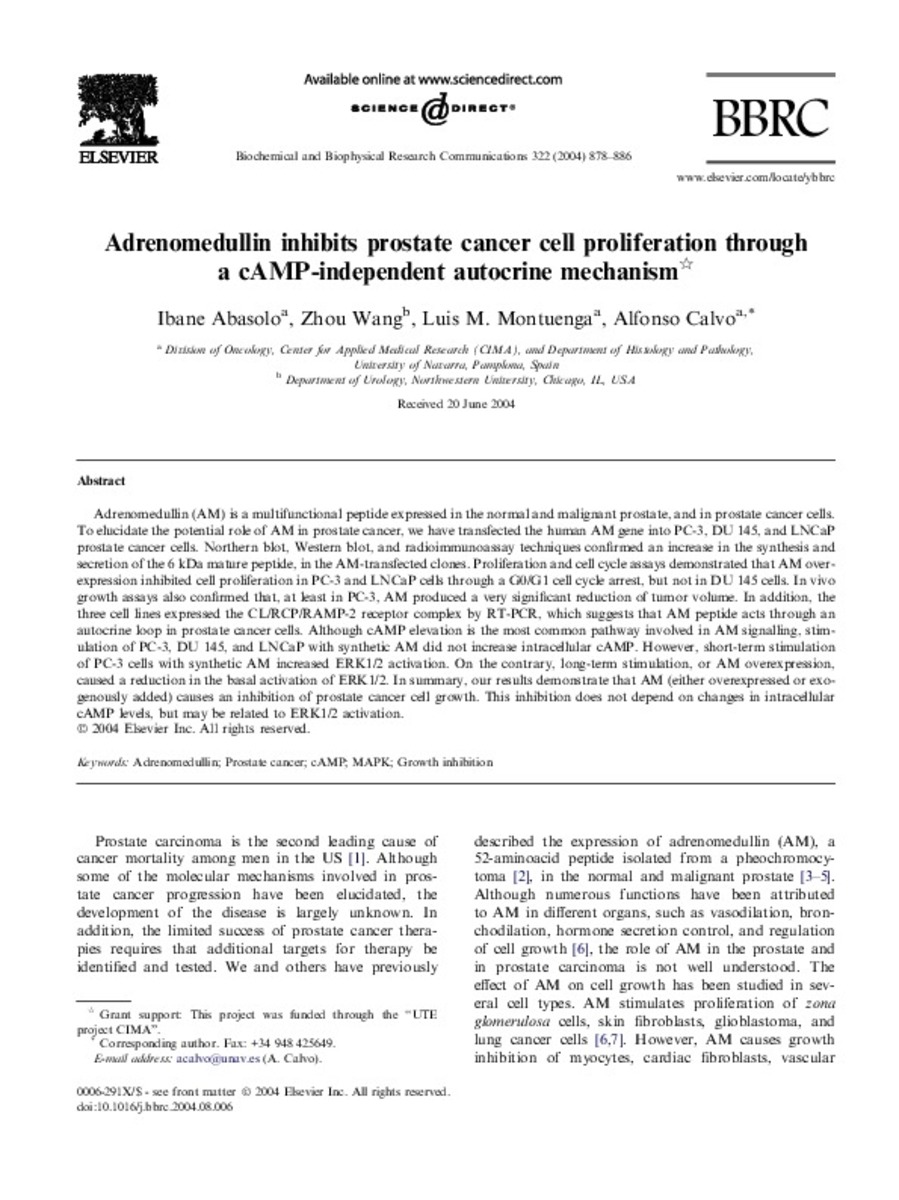Full metadata record
| DC Field | Value | Language |
|---|---|---|
| dc.creator | Abasolo, I. (Ibane) | |
| dc.creator | Wang, Z. (Zhou) | |
| dc.creator | Montuenga-Badia, L.M. (Luis M.) | |
| dc.creator | Calvo-González, A. (Alfonso) | |
| dc.date.accessioned | 2011-08-19T11:07:46Z | - |
| dc.date.available | 2011-08-19T11:07:46Z | - |
| dc.date.issued | 2004 | - |
| dc.identifier.citation | Abasolo I, Wang Z, Montuenga LM, Calvo A. Adrenomedullin inhibits prostate cancer cell proliferation through a cAMP-independent autocrine mechanism. Biochem Biophys Res Commun 2004 Sep 24;322(3):878-886. | es_ES |
| dc.identifier.issn | 1090-2104 | - |
| dc.identifier.uri | https://hdl.handle.net/10171/18808 | - |
| dc.description.abstract | Adrenomedullin (AM) is a multifunctional peptide expressed in the normal and malignant prostate, and in prostate cancer cells. To elucidate the potential role of AM in prostate cancer, we have transfected the human AM gene into PC-3, DU 145, and LNCaP prostate cancer cells. Northern blot, Western blot, and radioimmunoassay techniques confirmed an increase in the synthesis and secretion of the 6kDa mature peptide, in the AM-transfected clones. Proliferation and cell cycle assays demonstrated that AM overexpression inhibited cell proliferation in PC-3 and LNCaP cells through a G0/G1 cell cycle arrest, but not in DU 145 cells. In vivo growth assays also confirmed that, at least in PC-3, AM produced a very significant reduction of tumor volume. In addition, the three cell lines expressed the CL/RCP/RAMP-2 receptor complex by RT-PCR, which suggests that AM peptide acts through an autocrine loop in prostate cancer cells. Although cAMP elevation is the most common pathway involved in AM signalling, stimulation of PC-3, DU 145, and LNCaP with synthetic AM did not increase intracellular cAMP. However, short-term stimulation of PC-3 cells with synthetic AM increased ERK1/2 activation. On the contrary, long-term stimulation, or AM overexpression, caused a reduction in the basal activation of ERK1/2. In summary, our results demonstrate that AM (either overexpressed or exogenously added) causes an inhibition of prostate cancer cell growth. This inhibition does not depend on changes in intracellular cAMP levels, but may be related to ERK1/2 activation. | es_ES |
| dc.language.iso | eng | es_ES |
| dc.publisher | Elsevier | es_ES |
| dc.rights | info:eu-repo/semantics/openAccess | es_ES |
| dc.subject | Adrenomedullin | es_ES |
| dc.subject | Prostate cancer | es_ES |
| dc.subject | cAMP | es_ES |
| dc.subject | MAPK | es_ES |
| dc.subject | Growth inhibition | es_ES |
| dc.title | Adrenomedullin inhibits prostate cancer cell proliferation through a cAMP-independent autocrine mechanism | es_ES |
| dc.type | info:eu-repo/semantics/article | es_ES |
| dc.relation.publisherversion | http://www.sciencedirect.com/science/article/pii/S0006291X04017371 | es_ES |
Files in This Item:
Statistics and impact
Items in Dadun are protected by copyright, with all rights reserved, unless otherwise indicated.






